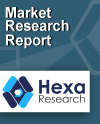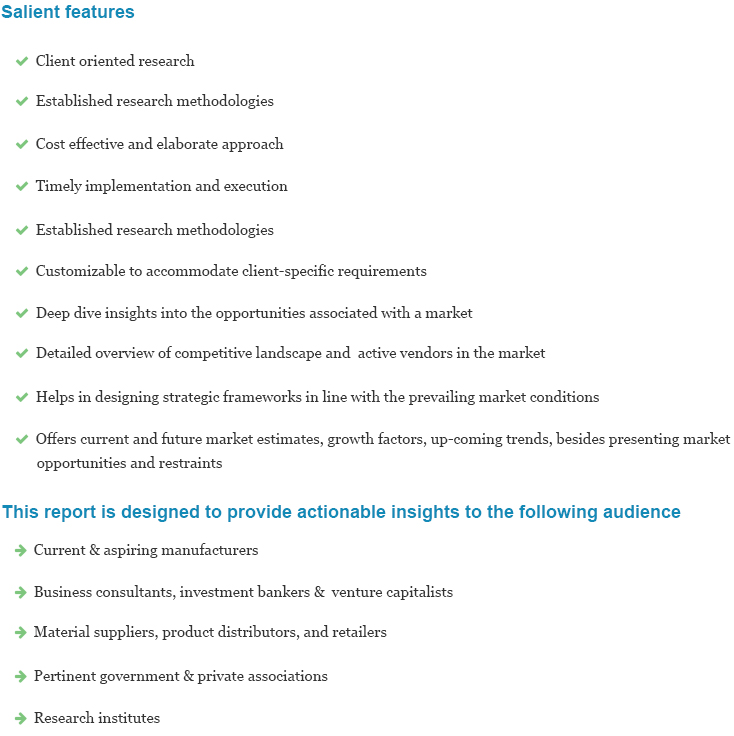
In-Car Apps Market Analysis, Market Size, Application Analysis, Regional Outlook, Competitive Strategies And Forecasts, 2016 To 2024
- Published: November, 2017
- Format: Electronic (PDF)
- Number of pages: 70
- Industry: Automotive & Transportation
The in-car apps market is expected to grow at a high CAGR from 2016 to 2024 due to the growing use of the infotainment platforms in vehicles. In-car apps help the driver to maintain focus while driving by providing certain features such as gesture recognition, voice control by eliminating the extra control buttons. They also offer features such as evolved cruise control, autonomous emergency brake, traffic jam warning, change of lane assist, blind spot data and autonomous emergency brake. The multiple uses of the apps are expected to lead to the immense growth in the in-car apps market.
The importance given to road safety, fuel economy & efficiency, security & insurance liability which are expected to propel the growth in the in-car apps market. The growing income levels in developing countries of Asia Pacific and Europe is anticipated to drive the demand for luxury vehicles and smart cars, which is in turn expected to drive the growth of the global in-car apps market.
In-car apps assist drivers in parking, car to car communications, lane departure, traffic signal warning, surround view systems and autonomous parking. It also provides additional features through sensor technologies such as camera, radar, and ultrasound.
The usage of the in-car apps helps monitor car repairs with the aid of smartphones. They also help customers to connect to various service professionals, carry out communication through texts, pictures, and videos. These apps help in the diagnostics of the vehicles by continuously monitoring vehicle damage and performance of different parts.
The implementation of in-car apps is advantageous to automobile manufacturers as they can exploit new revenue streams and create revenue sharing. The apps have become an essential platform for conducting business and managing customer relationships. Further, the car dealers utilize these apps to communicate servicing reminders, drive traffic to the showrooms and manage customer relationships.
Automobile manufacturing companies are concerned about the safety & reliability of the mobile app solutions, open app ecosystem, and app data privacy. The in-car apps market is at a nascent stage; this market is anticipated to grow at a rapid pace over the coming years on account of high investments in technological developments and innovation.
The in-car apps market can be segmented on the basis of applications into navigation, social networking, travel, music, entertainment, lifestyle, news, and weather. In 2015, navigation was the most widely used app in cars which accounted for around 53% market share followed by the weather app which accounted for an overall 40% market share.
The in-car apps market is segmented on the basis of technology into embedded model, external model, and hybrid model. In the embedded model the apps are downloaded in the vehicle and runs on the cars system.
The external model refers to the apps present in a smartphone or tablet which need to be connected to the car's system via Bluetooth or a USB port. The Hybrid model apps are accessed through a built-in technology.
The other applications of the in-car apps are books, business/productivity, health & fitness, points of interest/local and education and podcasts. This accounts for less than 15% usage among the users. The largest demand is expected for in-car music app over the coming years.
North America and Western Europe are estimated to have 92 million internet vehicles by 2016. Further, there is a high demand expected for the in-car apps from the Asia Pacific and the Middle East & Africa region on account of the rising demand for automatic and advanced cars. The luxury car market in Asia Pacific and the Middle East is also expected to experience tremendous demand over the coming years.
Ford Motor Company is in a process of developing a new app which is called Sync Connect and would be able to start, stop, lock, and unlock with the help of a remote. This app has features such as voice activation for smartphones that will allow free emergency calls and also allow the users to retrieve the status of car systems like fuel levels, oil level, tire pressure and battery status. This app consists of two-tier authentication security and will also require user confirmation of the system setup through the car console.
The top players in the in-car apps market are Apple Inc., Google Inc., and Mirrorlink. Microsoft which recently entered the market. The other prominent players in the market are Ford Motor Company, AT&T Inc, Delphi Automotive LLP, Alcatel-Lucent, Audi AG, NXP Semiconductors, General Motors and Sierra Wireless among others.

Choose License Type
- World's largest premium report database
- Transparent pre & post sale customer engagement model
- Unparalleled flexibility in terms of rendering services
- Safe & secure web experience
- 24*5 Research support service
